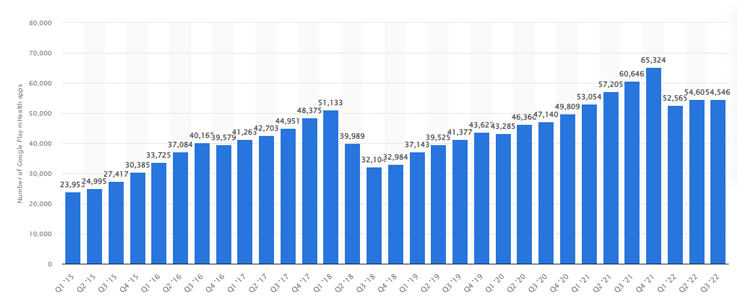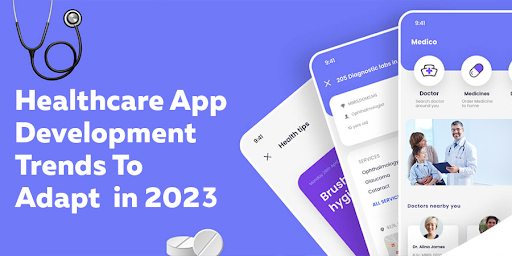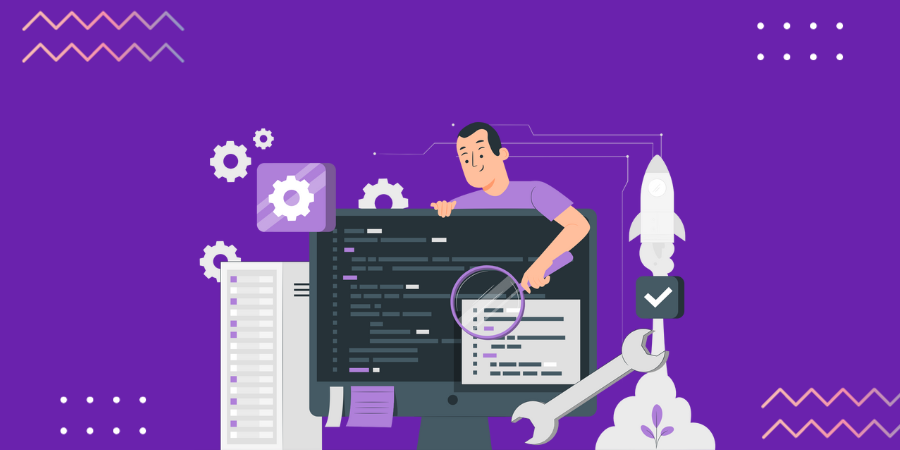Recent years have seen significant advancements in healthcare technology, and it is anticipated that these advancements will continue well into the year 2023. The development of healthcare applications is becoming increasingly important due to the advent of artificial intelligence (AI) and the Internet of Things (IoT). As per the last measured period, there were 54,546 healthcare applications available. The below graph will show you the number of mHealth applications available in the Google Play store from the 1st quarter of 2015 to the 3rd quarter of 2022.

Image Source:- Statista
It is anticipated that by the year 2023, the market for healthcare-related applications will be worth more than $50 billion. The impact that mobile technology has on the medical field will continue to grow along with its development. It is abundantly evident that mobile applications will continue to play a pivotal role in enhancing healthcare delivery, hence expanding access to high-quality medical care for all individuals.
Due to technological changes, the healthcare industry is growing rapidly. The medical app market will earn 111.1 billion dollars by 2025 due to its popularity and use. Considering popularity. The 2023 healthcare app development trends will assist practitioners and patients alike. Before proceeding, let’s examine why healthcare apps are so important in the modern era.
Mobile Apps’ Impact on Healthcare Today
The creation of healthcare apps for mobile devices is a rising industry. Healthcare professionals, patients, and other stakeholders can all benefit from using mobile apps. Mobile apps simplify life, improve communication, and speed up the process of providing care to those in need. The majority of today’s mobile apps are intuitive and user-friendly, saving their users time and stress. In addition, they are made to keep personal information and medical records protected. As a result, medical professionals no longer need to rely on paper records and can instead access patient information remotely.
The adoption of mobile apps has completely altered patients’ access to medical care. Appointment setting, doctor-patient communication, health record research, and remote vitals monitoring are all tasks that lend themselves well to mobile apps. Apps can help you remember to take your prescription, order lab tests, and check your findings. Providers and insurance companies may easily share patient medical records, making the entire process quick and painless for everyone involved. The creation of useful healthcare apps appears to have a promising future.
Healthcare App Development Trends to Follow
Technology in the healthcare industry is enabling a new era of healthcare services for medical professionals, patients, and service receivers. Thus, leading healthcare application development organizations are prioritizing new trends to give more ease to users.
1. Artificial Intelligence in HealthCare
The healthcare sector is only one of several that has benefited from the AI revolution. The use of AI in healthcare has influenced our expectations for healthcare in the future. Due to its potential to significantly change healthcare delivery, technology is predicted to be one of 2023’s top IT trends in the sector. It’s a collection of tools that can mimic human intelligence in the areas of understanding, perception, learning, and action within the healthcare industry.
From 2023 to 2028, the global market for AI in healthcare is estimated to expand from USD 14.6 billion at a CAGR of 47.6% to USD 102.7 billion. The rising need for improved healthcare services, the complexity of healthcare datasets, and the growing need to cut healthcare costs are pushing the development of AI in healthcare.
2. AR & VR (Virtual Reality & Augmented Reality)
Virtual reality and Augmented reality have been at the forefront of changing patients’ and physicians’ experiences alike. Here are some of the most common apps of virtual reality in the healthcare industry:
- Training physicians and surgeons with important medical insights.
- Helping surgeons and medical staff conduct surgeries and practice operations.
- Reinforcing the research and development sector to give better study materials to future healthcare professionals.
As per the Harvard business review study, there is a 230% boost in the performance of Virtual Reality trained surgeons as compared to others. On the other hand, AR (Augmented reality) also helps in empowering the healthcare sector in numerous ways.
3. Healthcare Wearable Technology & Sensors
Wearable healthcare technology allows patients to track their own vitals and other health parameters while at home or on the go. Medication, food, and lifestyle decisions can all benefit from this information. Additionally, most of these wearables have functions like medicine reminders or exercise tracking. The capacity of wearables to give meaningful data for both the patient and the doctor is driving their rapid adoption in the healthcare industry.
In 2023, it is anticipated that the prevalence of healthcare wearables would increase even further. Therefore, healthcare providers must ensure they have the necessary data and technology infrastructure to accommodate the influx of health data generated by these devices. Wearables help you to monitor and track your regular physical activities- from your heartbeat to your blood pressure to your anxiety.
4. Blockchain Technology In Healthcare App
The healthcare business can benefit from blockchain technology in numerous ways, including improved data integrity and security. Patients can have more say in their medical records and can be certain that they are kept in a secure location that only they have access to. It could also be used to streamline administrative tasks like claims processing and medical record verification.
Blockchain technology has several potential applications in the healthcare industry, including electronic medical records management, drug tracking systems, artificial intelligence-driven diagnoses and treatments, virtual consultations, and more in the near future. Because of this, the healthcare system will undergo dramatic transformations, becoming both more efficient and cost-effective while simultaneously raising the bar for patient care. It’s not surprising that many businesses have already begun to adopt this technology. Blockchain technology provides an automated environment where authorized staff and doctors can easily access and transfer data.
5. Internet of Medical Things (IoMT)
As the healthcare industry undergoes its own digital transformation, the Internet of Medical Things (IoMT) plays a vital role. The Internet of Medical Things (IoMT) is a system of interconnected healthcare devices that can be remotely monitored and analyzed. The use of this technology has many advantages, including enhanced patient care, greater efficiency, and clearer lines of communication among physicians, nurses, and patients.
Improvements in healthcare response times, data collection from a wider variety of sources, and remote patient monitoring are all possible because of the development of IoMT. Because of this, medical staff can more easily maintain track of their patient’s information, and patients can save money by avoiding unnecessary doctor appointments. In addition to improving data collecting and processing, IoMT helps lower the likelihood of human error. Providers of medical treatment will benefit from this because they will be able to make better, more informed decisions.
6. Cloud Computing in Healthcare
The task of storing patient information or paperwork is, according to any healthcare worker, one of the most difficult. Yet many of these chores would become simpler than ever before with the introduction of cloud-based alternatives. Electronic Health Records (EHR) of patients can be kept and accessed seven days a week. DataDynamics Inc.’s research indicates that the healthcare industry is thought to keep about 30% of all digital records worldwide. And it is anticipated that this contribution will grow by 6–11% faster than the manufacturing, financial, and media & entertainment sectors, reaching 36% by 2025.
17Benefits from cloud-based technologies are not limited to hospital administration; health insurance providers also benefit. They are able to securely store important information, including each patient’s insurance and premium payment information. Consequently, we can state with confidence that 83% of the structured and unstructured data in the healthcare sector is kept on cloud platforms for improved availability, accessibility, and management as well as security assurances.
7. Women Wellness Apps
One study found that women make up half of all healthcare app users worldwide and are more likely than men to make use of healthcare apps. Then why not use their niche market app instead? As a result, analysts predict that by 2025, the FemTech market will be worth USD $50 billion. Health and wellness care for modern women needs cutting-edge approaches. During key times like the menstrual cycle, pregnancy, and post-labor, the app might include elements like a personalized food plan, exercise, meditation, charting the cycle along with the ovulation period, and many others. Therefore, creating such apps for women’s health could have a positive impact on the world. Clue, Flo, and Natural Cycles are popular women’s health applications that have between 500,000 and 100,000,000 downloads from the Google Play Store and the Apple App Store, respectively.
8. Metaverse for Healthcare Apps
By introducing the Health 4.0 landscape, the Metaverse plays a crucial role in healthcare for both patients and professionals. It makes use of Web 3.0 and new technologies such as artificial intelligence, augmented reality, virtual reality, and 5G networks to provide affordable medical care. Market Research Future (MRFR) predicts that the healthcare metaverse will be worth over $5,373,000,000 by 2030, growing at a CAGR of 48.3% from 2018 to 2030. According to research on the compatibility of the metaverse with the healthcare industry, it can be used to improve outcomes in a variety of settings. Metaverse healthcare products, such as Digbi Health, XRHealth, NeuroTrainer, etc., are revolutionizing healthcare delivery and opening up exciting new possibilities.
9. Telemedicine
The telemedicine industry has been expanding rapidly over the past few years. Because of healthcare app development services, the telemedicine business has grown user-friendly and the medical information procedure has become less cumbersome. Doctors across the world agree that telemedicine is an excellent resource for learning about a patient’s health background. Additionally, the idea of telemedicine has expanded beyond physical places and aids in keeping patients and doctors in close contact. Patients and doctors can have an immediate, two-way conversation about critical health issues via video or audio call. To put it another way, these apps make it possible to see patients without really having to go to a hospital or clinic.
Final Words
With the rise of healthcare app development, the healthcare sector has seen a dramatic transformation. People no longer need to travel great distances to receive medical attention. Healthcare apps are helpful for patients and profitable for app studios. The healthcare app market is becoming increasingly competitive as demand rises. However, app developers should put customer demands first and create their products accordingly. Choose a qualified healthcare app development company with a team of mobile app developers who have real-world expertise in building mobile healthcare apps if you want to create an effective healthcare app.





